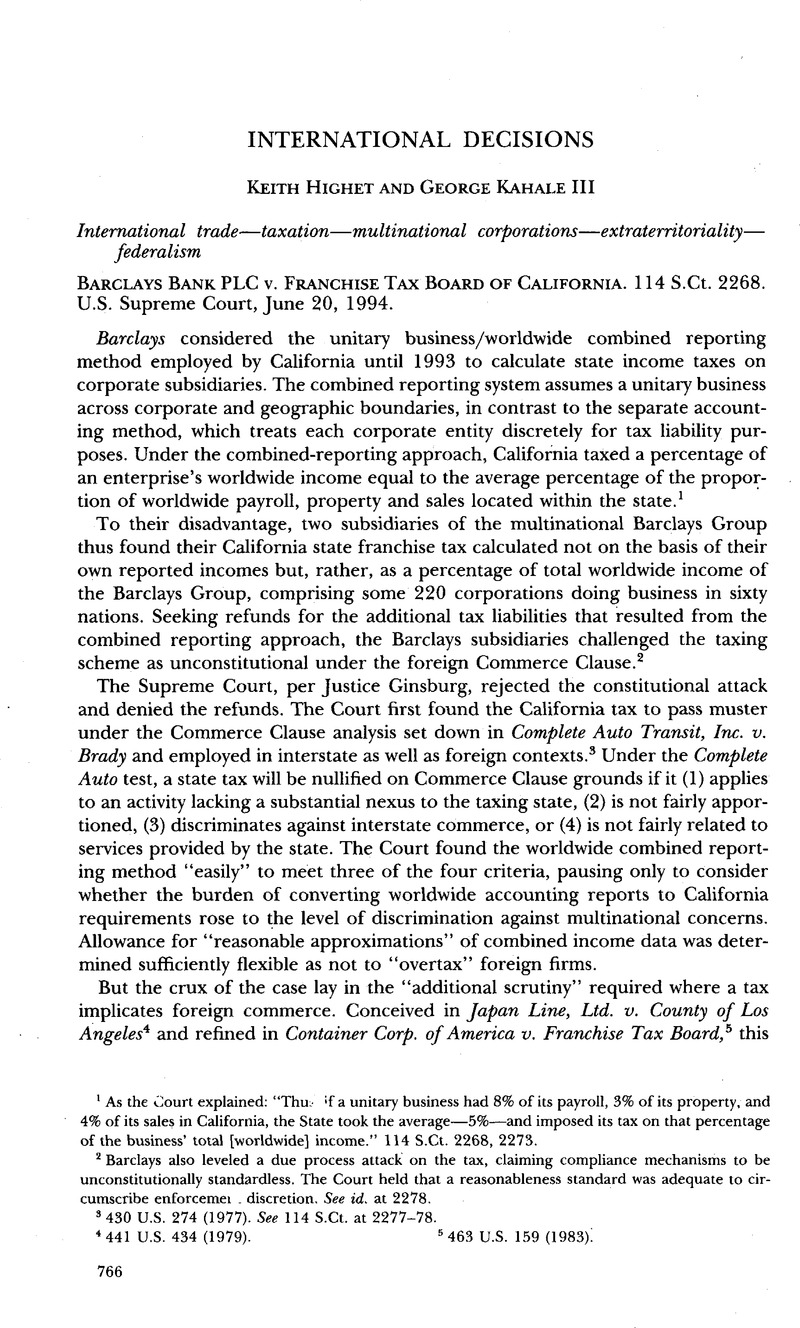No CrossRef data available.
Published online by Cambridge University Press: 27 February 2017

1 As the Court explained: “Thus if a unitary business had 8% of its payroll, 3% of its property, and 4% of its sales in California, the State took the average—5%—and imposed its tax on that percentage of the business’ total [worldwide] income.” 114 S.Ct. 2268, 2273.
2 Barclays also leveled a due process attack on the tax, claiming compliance mechanisms to be unconstitutionally standardless. The Court held that a reasonableness standard was adequate to circumscribe enforcement discretion. See id. at 2278.
3 430 U.S. 274 (1977). See 114 S.Ct. at 2277–78.
4 441 U.S. 434 (1979).
5 463 U.S. 159 (1983).
6 114 S.Ct. at 2281.
7 The Court in Container Corp. explicitly reserved judgment on the constitutionality of worldwide combined reporting as applied to subsidiaries of foreign-based corporations such as the Barclays Group. See 463 U.S. at 195 n.32.
8 Taxpayers in both Barclays and Container Corp. were conceded to have incurred actual multiple taxation.
9 477 U.S. 1 (1986). Wardair upheld a state tax on aviation fuel, including fuel purchased by foreign carriers for use on international routes.
10 114 S.Ct. at 2283–84 (citations omitted).
11 This argument was raised by Colgate-Palmolive Co., a U.S. parent with foreign subsidiaries whose parallel challenge to the California tax was consolidated with Barclays’ in the Supreme Court. 114 S.Ct. 379 (1993) (memorandum).
12 114 S.Ct. at 2286. On this score, the strength of executive branch positions was considerably sapped by their own inconsistency. See id. at 2288 (O’Connor, J., dissenting); see also Clinton Backs California Over Tax, Fin. Times (London), Jan. 24, 1994 (reporting fulfillment of Clinton campaign promise to reverse federal opposition to California tax scheme).
13 114 S.Ct. at 2285–86 (quoting Harisiades v. Shaughnessy, 342 U.S. 580, 589 (1952)).
14 See, e.g., Perpich v. Department of Defense, 496 U.S. 334 (1990) (denying states’ capacity to withdraw from National Guard training exercises); Japan Line, Ltd. v. County of Los Angeles, 441 U.S. 434 (1979) (striking down state tax on foreign-owned cargo containers); Zschernig v. Miller, 389 U.S. 429 (1968) (striking down state escheat statute discriminating against citizens of East bloc nations); United States v. Pink, 315 U.S. 203 (1942) (state property law overcome by terms of federal recognition of Soviet Union); Hines v. Davidowitz, 312 U.S. 52, 63 (1941) (striking down state statute requiring registration of aliens).
15 To the continuing chagrin of Justice Scalia, who would abandon the “one voice” test along with the dormant Commerce Clause. See 114 S.Ct. at 2287 (Scalia, J., concurring in part and concurring in the judgment).
16 Cf. Anne-Marie [Slaughter] Burley, Law Among Liberal States: Liberal Internationalism and the Act of State Doctrine, 92 Colum. L. Rev. 1907, 1921 (1992) (noting dialogue among courts of democratic countries).
17 See Richard B. Bilder, The Role of States and Cities in Foreign Relations, 83 AJIL 821 (1989). The most recent international context in which states have asserted their interest is that involving the NAFTA and Uruguay Round GATT accords. See NCSL Tentatively Backs GATT Accord If State Authority Is Guaranteed, 11 Int’l Trade Rep. (BNA) 1165–66 (1994).
18 114 S.Ct. at 2289 (O’Connor, J., dissenting).
19 114 S.Ct. at 2281. California now allows corporations to elect a “water’s edge” reporting option under which they may limit their combined reporting to entities whose presence in the United States surpasses a certain threshold. This option had previously been available upon payment of a substantial fee. See id. at 2273–74.
20 See Income and Corporation Taxes Act 1988, pt. XVIII, ch. III, §812 and sched. 30, paras. 20 and 21 (Eng.); see also UK Warns on Unitary Tax, Fin. Times, May 14, 1993 (noting UK legislation designed to remove tax credits from nonresident companies connected with states employing unitary taxing system).
21 As the Japan Line Court noted in striking down a state tax on foreign-owned containers, retaliation by a foreign country would “of necessity” be directed at the United States as a whole and not just the taxing state. See 441 U.S. at 450. As demonstrated by the United Kingdom’s action against California, that premise may no longer be accurate.
22 114 S.Ct. at 2285.